Key takeaways:
- Gender equality advocacy requires personal reflection and challenging societal norms to promote true equality.
- Empowerment is essential for advocacy, creating solidarity among individuals and enhancing the effectiveness of their messages.
- Effective advocacy involves understanding the audience, building coalitions, and utilizing storytelling to foster emotional connections.
- Building support networks and mentorship is crucial in nurturing future advocates and overcoming challenges in advocacy efforts.
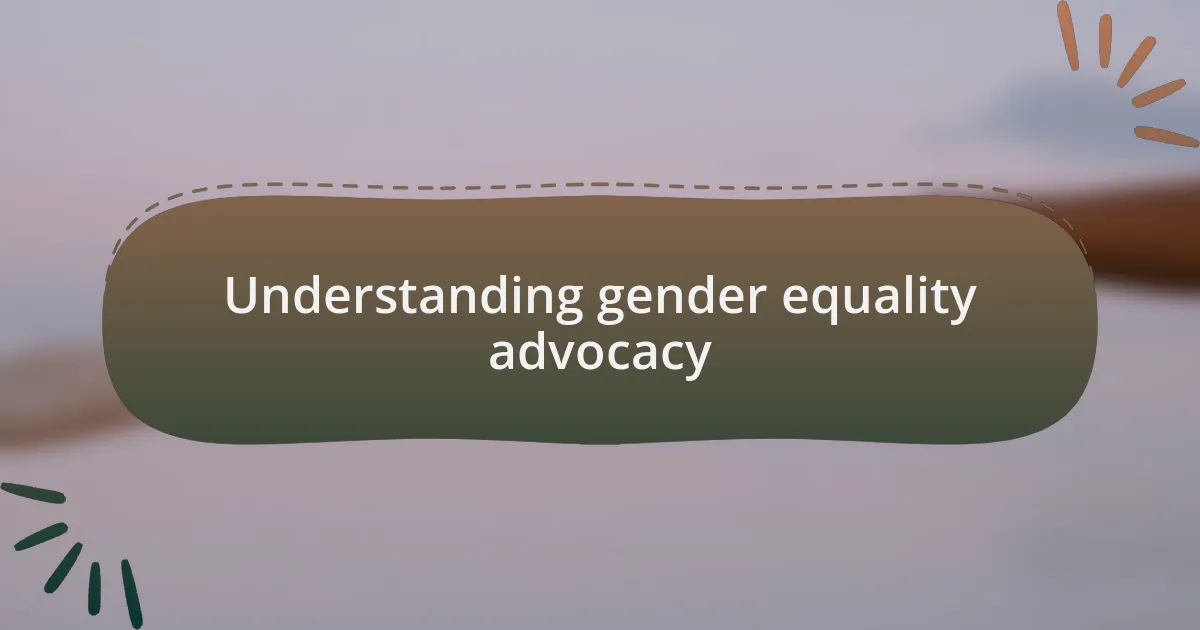
Understanding gender equality advocacy
Understanding gender equality advocacy is a journey that many of us embark on without initially recognizing the depth of its impact. I recall a time when I attended a workshop on gender equality; the stories shared by women from various backgrounds left me profoundly moved. Their experiences highlighted not just the struggles but also the resilience that comes from advocating for one’s rights.
At its core, gender equality advocacy is about ensuring that all individuals, regardless of gender, have equal opportunities and rights. I often wonder, what does equality really mean in practice? It’s not simply about policies but also about changing societal norms and attitudes. I remember discussing this topic over coffee with friends, where we realized that true equality requires us to challenge our own biases—something that can be uncomfortable but ultimately transformative.
The emotional weight of this advocacy is significant. I once participated in a community event where we shared personal stories of gender-based discrimination. Listening to others opened my eyes to the nuanced layers of gender issues, prompting me to reflect on my own privileges and responsibilities. Isn’t it fascinating how personal experiences can foster a collective understanding that propels advocacy forward? It’s this connection—between hearts and minds—that fuels the drive for lasting change.
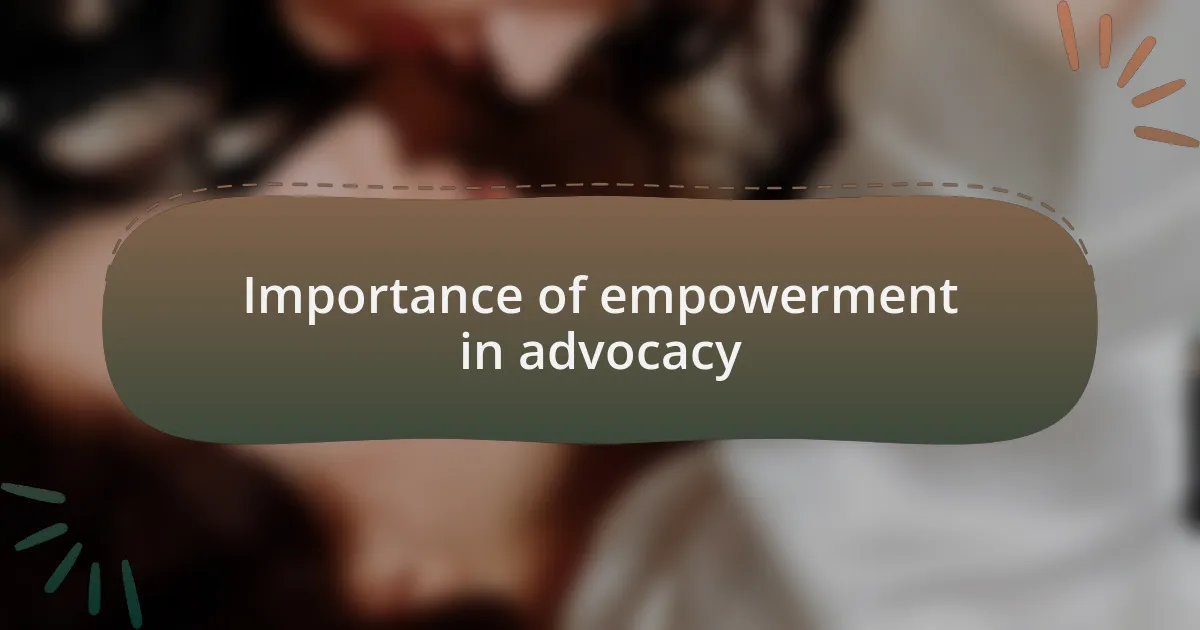
Importance of empowerment in advocacy
Empowerment in advocacy serves as a catalyst for change, unlocking the potential of individuals to challenge the status quo. I remember my first experience leading a grassroots initiative; it was empowering to see my peers transform from passive observers into proactive advocates. This shift not only fueled our collective passion but also created a space where diverse voices could be heard and valued.
The importance of empowerment extends beyond personal development; it cultivates solidarity among advocates. When individuals feel empowered, they are more likely to support one another and share resources, creating a network of interconnected advocates. I once volunteered at an organization where we shared strategies and successes, and that collaborative spirit made me realize how much we can achieve together.
Moreover, empowerment enhances credibility and effectiveness in advocacy efforts. When people speak from their own experiences and empowerment, their voices resonate more authentically. I’ve witnessed this firsthand; during a panel discussion, a fellow advocate shared her journey of overcoming barriers, captivating the audience and inspiring action. Isn’t it incredible how personal stories can bridge gaps and invite others to join the movement?
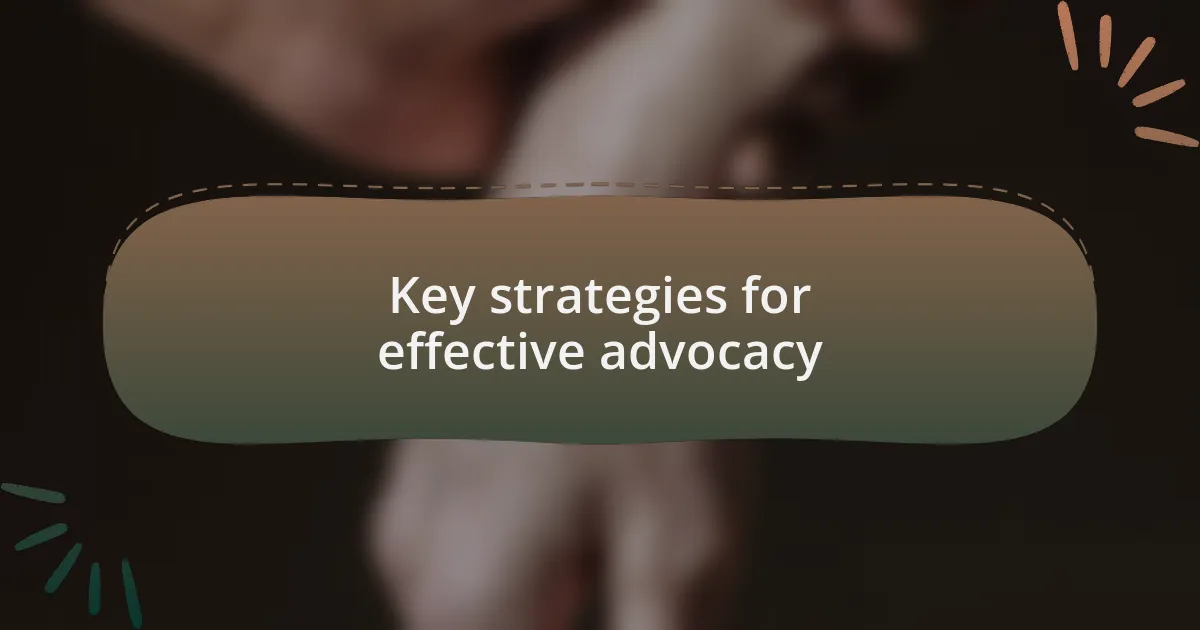
Key strategies for effective advocacy
Effective advocacy hinges on understanding and connecting with your audience. I once participated in a campaign where we tailored our message based on feedback from the community. It was eye-opening to see how much more powerful our advocacy became when we listened first and then crafted our approach—people felt seen and heard, which ignited their involvement. Have you ever noticed how a message resonates differently when it’s spoken directly to someone’s concerns?
Building coalitions is another critical strategy in advocacy. I remember working alongside various organizations, each bringing unique perspectives and strengths to the table. This collaborative effort not only amplified our voice but also fostered a sense of belonging among diverse groups. It made me realize that when we unite, our collective power can challenge systemic issues much more effectively. How could one organization alone compete with the strength of many?
Lastly, storytelling is a compelling tool for advocacy. I’ve found that sharing personal experiences creates a deep emotional connection, bridging gaps between advocates and their audiences. There was a time when I shared my struggles with gender bias during a workshop. The vulnerable space we created allowed others to share their stories too, reinforcing the notion that we are not alone in this journey. What stories have you carried that could inspire change in others?
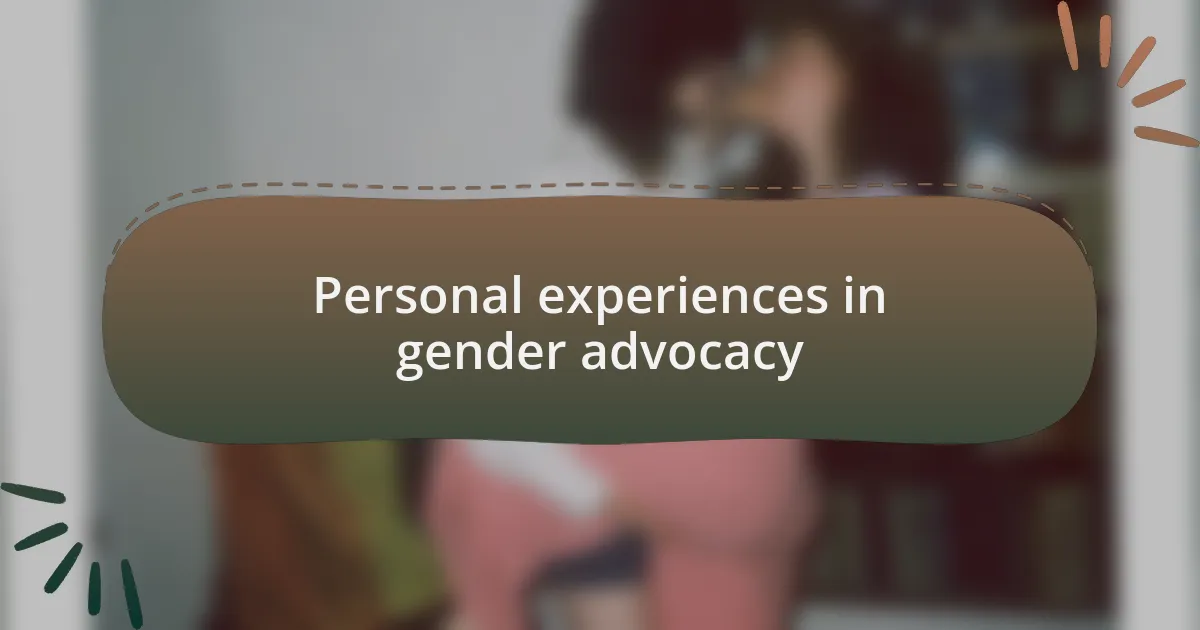
Personal experiences in gender advocacy
Engaging in gender advocacy has been a transformative experience for me. I vividly recall attending a local forum where I witnessed firsthand the power of community voices. As people shared their experiences of discrimination, anger and hope filled the air. It struck me how emotional storytelling could build bridges between individuals who felt isolated in their struggles. Have you ever felt a sense of relief simply by hearing someone else articulate your own feelings?
Participating in awareness campaigns, I learned that not every interaction would be positive. I faced resistance when discussing the importance of gender equality in my workplace. But those challenging conversations allowed me to reflect on my own biases and fears. I realized that discomfort often accompanies growth. Has confronting a tough topic ever led you to a deeper understanding of yourself and others?
One memorable experience was when I facilitated a workshop aimed at empowering young girls to express their opinions confidently. Watching them bloom as they discovered their voices was incredibly rewarding. It reminded me that advocacy isn’t just about raising awareness—it’s about nurturing future advocates. Can you recall a moment when you felt empowered to share your voice?
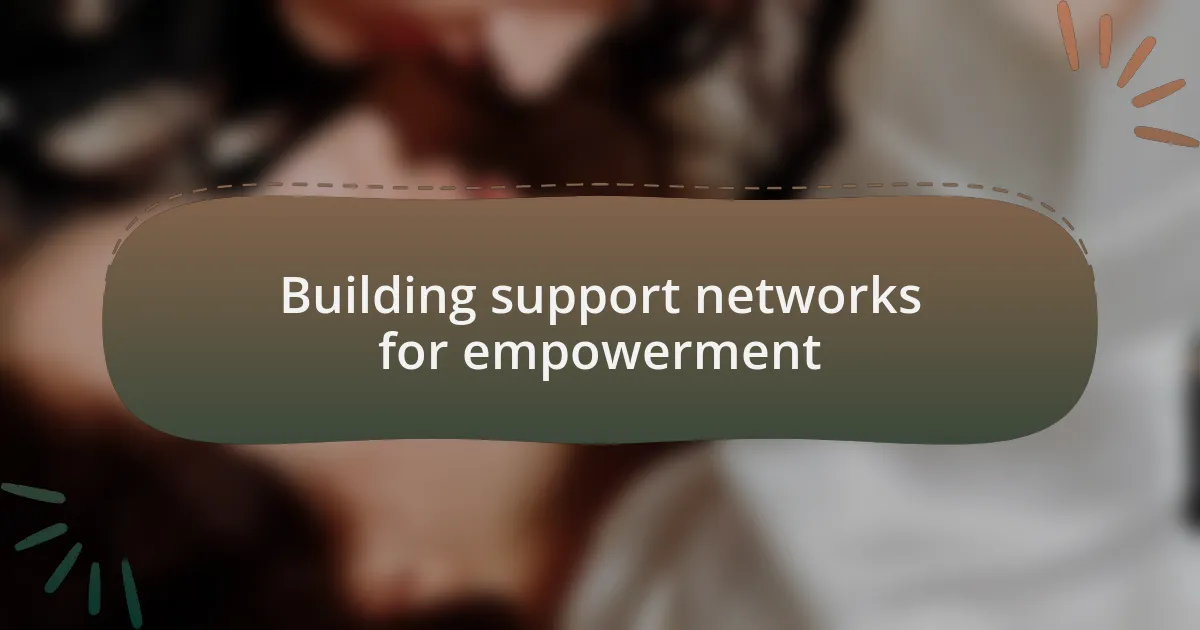
Building support networks for empowerment
Building support networks for empowerment is essential in the journey toward gender equality. I remember when I joined a local women’s group; it felt like stepping into a circle of warmth and understanding. The shared stories created a tapestry of connection that made me realize I wasn’t alone in my struggles. Have you ever found solace in a community that understood your experiences?
The strength of these networks lies in the diversity of perspectives they bring together. At one gathering, we discussed the various challenges women face in different sectors. Hearing someone from a corporate background share her hurdles made me reevaluate my own experiences. How often do we underestimate the insight we can gain from simply listening to others?
I’ve witnessed how mentorship can blossom within these networks. A young advocate recently reached out to me for guidance, and recalling my own early days, I felt a surge of motivation to support her journey. There’s something profoundly fulfilling about lifting others as you climb. Have you considered how your own experiences could light the way for someone else?
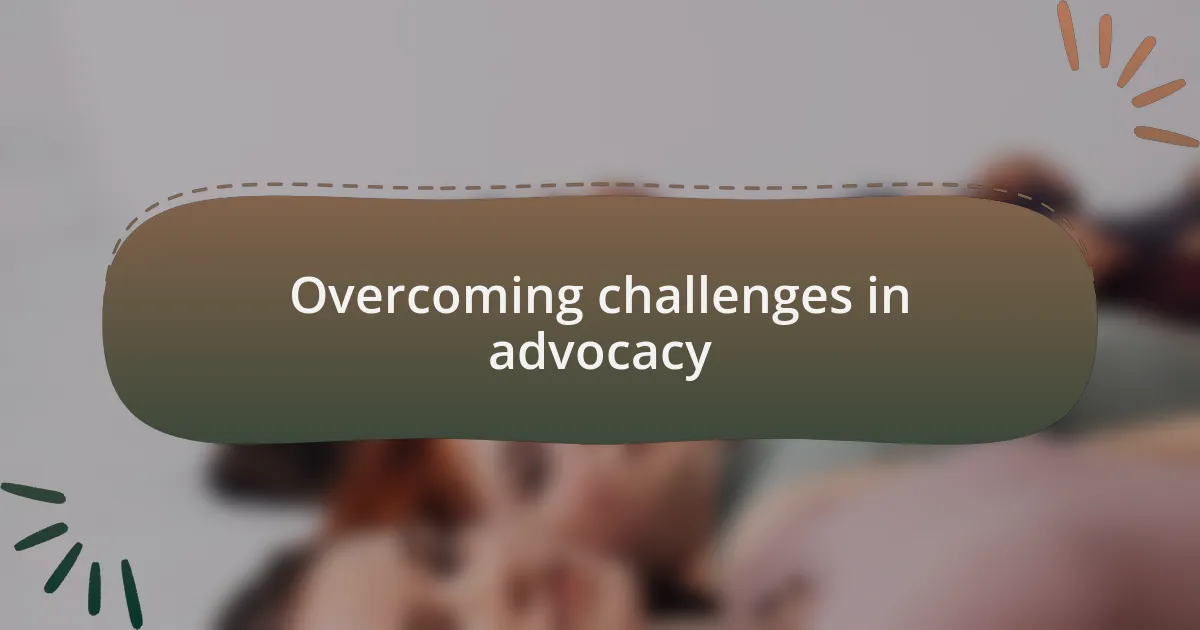
Overcoming challenges in advocacy
Overcoming obstacles in advocacy requires a resilient mindset. I distinctly recall a campaign we launched that faced immense pushback from unexpected sources. It felt disheartening at first, especially when I poured my heart into crafting our message. But it became clear to me that challenges often reveal the strength of our convictions. When have you found strength in adversity, and how did it shape your approach?
Navigating skepticism can be daunting, yet it teaches us invaluable lessons about perseverance. During one particular town hall meeting, I was met with questions that felt more like personal attacks rather than constructive criticism. Instead of retreating, I chose to view them as an opportunity to clarify my stance. How often do we reconsider our responses when faced with doubts from others?
Resilience also means adapting our strategies when faced with failure. I remember when a program I spearheaded didn’t reach its intended audience. I felt frustrated, but that experience pushed me to explore new outreach methods. It taught me that every setback is really just an opportunity in disguise. Have you ever turned a failure into a stepping stone for future success?
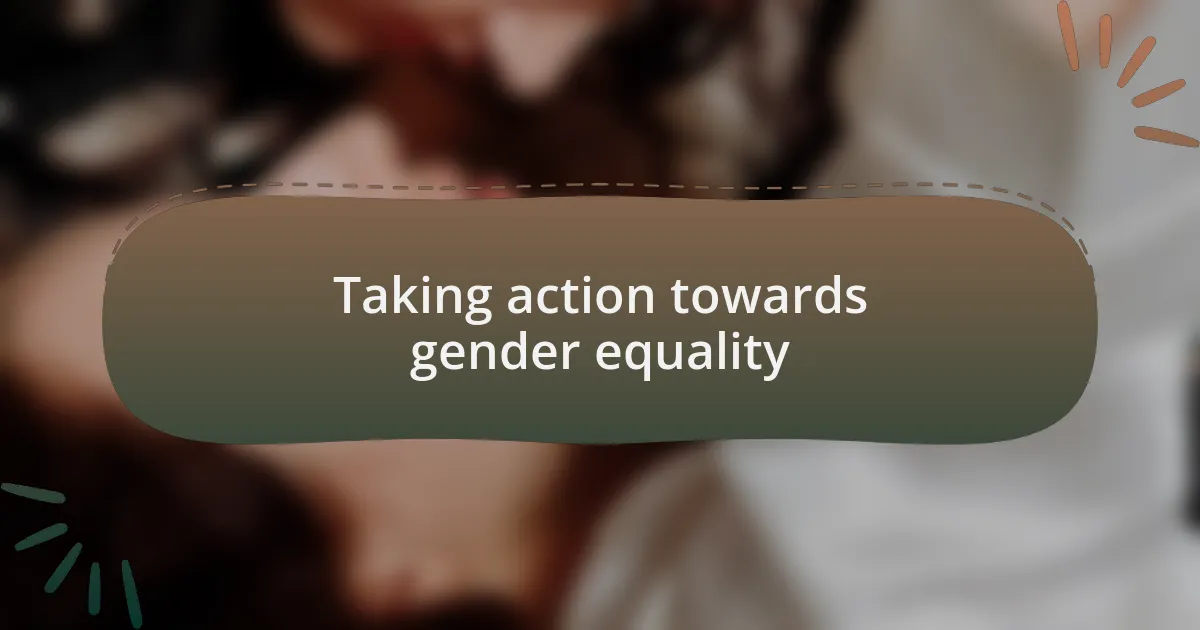
Taking action towards gender equality
Taking action towards gender equality sometimes feels like standing at the foot of a mountain, looking up at a peak that feels distant. I still vividly remember the first community workshop I organized. I was filled with excitement, but I also felt the weight of responsibility. That day, as participants shared their experiences, I realized that every voice matters in this journey. How often do we underestimate the power of collective stories?
Engagement is crucial, and it often requires stepping out of our comfort zones. I once challenged myself to speak at a local fair about gender equality, knowing full well that not everyone would be receptive. The thrill of sharing ideas with an audience and sparking discussions among strangers was unmatched. But it also made me question: how can we effectively foster dialogue in spaces where opinions collide?
Moreover, action means collaboration. I initiated a partnership with a local organization dedicated to women’s empowerment. Together, we launched a mentorship program that paired experienced professionals with young women. The growth I witnessed, not just in the mentees but also in the mentors, was profound. What collaborative efforts have you seen make a meaningful impact in your community?